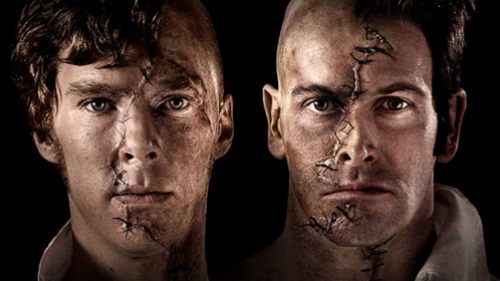T2 TRAINSPOTTING Review: A Work Of Nostalgic Confrontation
James Cameron’s Terminator 2 is the greatest sequel of the '90s. So it only makes sense that the follow-up to Danny Boyle’s Gen-X staple, Trainspotting, would be called T2. This is how the central Scottish heroin addicts – Mark Renton (Ewan McGregor), Sick Boy (Jonny Lee Miller), Spud (Ewen Bremner) and Begbie (Robert Carlyle) – would likely condense the title to their own story’s continuation. The abbreviation actually sums up a rather large chunk of the nostalgia that drives Boyle’s trip back to Edinburgh. Mark returns after being gone for twenty years, the £12,000 he stole from the boys and his subsequent marriage abroad both having bitten the dust. Like all “coming home” tales, there’s a wistful need to return to the past that infects all of these aging fuck ups’ brains. But his actions, along with the feelings of betrayal, guilt and loss that lingered with his former mates, are not just there to be reconsidered. The central thesis of T2 is that we all must confront the things we’ve done and the people we’ve hurt, or risk never moving forward as human beings. It’s a recovery approach to narrative, seeking closure as much as it’s an extension.
Partially pulling from Irvine Welsh's "Porno", T2 banks on our awareness of the eponymous original novel (which is also credited as a source for John Hodge’s screenplay). In the sequel's wisest decision, Boyle catches us right up with where all the characters are now in life before we even get the movie’s title card. Mark’s living in Amsterdam; collapsing on a treadmill due to a heart condition he had no previous awareness of before slamming his face on the rotating belt. Sick Boy (who's now dropped the moniker in favor of his birth name, Simon) is blowing coke like it’s ‘87, staying up all hours of the night while his beautiful prostitute companion, Veronika (Anjela Nedyalkova), fucks rich men in the ass with a strap-on so he can videotape the act and blackmail them. Spud’s bottomed out completely, losing rights to see his young son thanks to an interminable scag addiction that keeps him from holding down a job or making it to any sort of required meeting on time. Begbie, of course, is still behind bars, attempting to strangle his own counsel after he hears that his latest review did not go as planned. To be completely frank, each and every one of the characters is pretty much where you imagined they would be twenty years after the events of Trainspotting, give or take an OD or three.
This expectedness is what’s either going to make or break T2 for a lot of viewers. Those hoping for some sort of elaborate surprise or significant change in the boys’ lives are going to be sadly disappointed. Though sometimes the most obvious storytelling decisions are the wisest, as Boyle and Hodge’s sequel asserts that the past twenty years were more about pressing the pause button than they were a period spent learning anything at all. Simon’s taken over his aunt’s pub in Leith, which probably seemed like a good idea at the time (as he hoped the area would become a gentrified, middle-class hipster hangout), but really only led to him pulling pints for broke geezers. Begbie’s been literally locked in a cage, resulting in a desperate escape that involves him staging a shanking by a still scared cellmate. Renton took his infamous “choose life” repurposing of the ancient UK drug prevention campaign (which he regurgitates here in a moment that borders on being the '90s cinema equivalent of fan service) quite literally. Instead of heroin, he chose exercise and healthy living, pushing his body to the limits and looking as good as a Gen-X lifer ever has during the Millennial Reign. Only Spud seems to have made peace with the fact that his life has gone nowhere – a revelation that leads to a suicide note and attempt at giving the planet back some of the oxygen he’s wasted.
This arrested development outlook T2 takes may be bleak, but also guides each of the mates toward tackling the misdeeds of their past. While he may be the most outwardly “together” of the four, Mark is arguably the most cowardly. He’s endeavored to (quite plainly) outrun his addiction, and even lies to Simon about having a wife and kids back home. But he falls back into the same groove once his bleached blonde bestie breaks out the lagers and cocaine, reveling in all-night revisits of football highlights and pulling debit card heists in order to finance a brothel for Simon and Veronika (whom he also begins sleeping with). Begbie attempts to bestow his own sins upon his teenage son after slipping in through a window, hoping his seed will give up college dreams to follow in his father’s grand theft footsteps. When the kid refuses, he offers him the first shot in da’s face, puffing his chest in such a familiar fashion that we’re practically waiting for the degenerate to call the seemingly good kid a “doss cunt”. For anyone with a domineering father who can’t leave the glory days in their own personal record books, the scene will be uncomfortably recognizable. Moments of clarity are slow to come, but when they do, they hit harder than any needle ever could, resulting in teary-eyed acceptance in order to avoid individual apocalypses.
It’d be easy to perceive Boyle’s return to these comfortable cinematic stomping grounds as a backslide in terms of formal application (especially given the uniformly excellent Steve Jobs’ relative financial failure). Nevertheless, the English auteur is just too damn energetic and enthusiastic to deny, even as he lives out his own 60th year of existence. Boyle doesn’t miss a single techno-driven beat, throwing Mark and Simon into dangerous nationalist pubs and neon clubs as they continue their downward spiral into being wayward twenty-somethings all over again. The director also handles the quiet moments with pastoral aplomb, as eye-openers come and spats occur on those rolling Scottish hillsides (a conversation between Mark and Simon regarding a certain baby is especially affecting). This is a master filmmaker referencing his own work (the usage of Underworld’s “Born Slippy” eliciting a near Pavolvian emotional response) as cinematographer Anthony Dod Mantle continues to push the art of digital photography into beautiful territories neither could’ve conceived when they first shot 28 Days Later… together in ‘02. Like all of Boyle’s output, T2 is an absolute visual feast; its numerous moments of spectacular opticals lingering in memory long after the credits have rolled.
What if we never change? What if we only get the life that we deserve, thanks to the choices we’ve made along the path we’ve selected for ourselves? What if that’s OK? These are all questions T2 asks and doesn’t really seem to feel the need to provide any concrete answers for. Narrative threads are resolved, and further options are explored by each of the dope and violence fiends we came to know so well back in ‘96. But as the needle drops and Mark hears “Lust for Life” for what seems to be the first time since it introduced us to him after he rolled over the hood of that car, audience members can’t help but also take stock of our own lives and where we are as human beings. T2 may relive the fleeting sensation of youth that these middle-aged men should probably let slip into the past, yet that doesn’t make it any less vital or touching as a piece of filmmaking. Because through this speedy recollection of days gone by, Boyle taps into a universal core that’ll touch the souls of any who know they’ve fucked up before and don’t quite know what to do with that self-awareness. In this sense, T2 is not only a great film in its own right, but a perfect continuation of a classic that more than likely didn’t need to be expanded upon. These men chose life, and now they have to confront just what the hell that means like the rest of us.



